Outreach-Minded Engineering Students Hope to Steer Local Youth into STEM
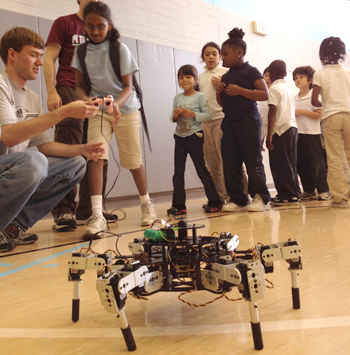
BTW students get to operate one of Mechanical Science's hexapod robots.
May 29, 2012
On a handful of Monday afternoons this past spring, a few students left the cloistered confines of Illinois’ Engineering campus to initiate nearly 80 local elementary students into the mysteries of mechanical engineering. A love of both kids and engineering prompted these Mechanical Sciences and Engineering (MechSE) students to devote their Monday afternoons volunteering at the newly organized Technology Club of Booker T. Washington STEM Academy.
An introductory visit was facilitated by I-STEM Associate Director Bob Coverdill, who knew the school was trying to start a technology club and immediately thought of MechSE students. After just one pilgrimage to the STEM academy's fledgling tech club, these members of Pi Tau Sigma, the Mechanical Engineering Honor Society, were hooked. They offered to help on a more permanent basis, taking on the responsibility of working with the club for the last four weeks of the school year, and again in 2012–13. Spearheaded by engineering students Chris Delaney and Madison Whitt; MechSE’s Coordinator of Alumni and Student Relations, Betsy Powers; BTW's visual arts teacher, John Odum; and I-STEM's Bob Coverdill (the team who coordinated the effort); the MechSE students introduced the promising young scientists to the following engineering topics.
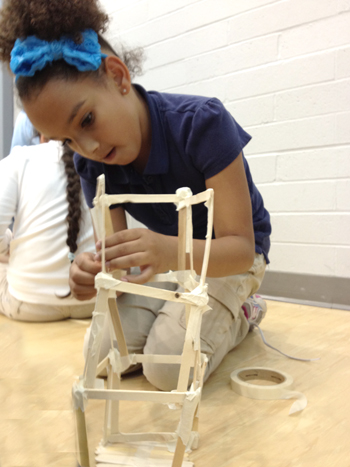
BTW student uses Popsicle sticks to build a structure during Technology Club.
- Buoyancy. In this lesson on density and buoyancy, after learning the Archimedes principle and why a beach ball floats and a bowling ball doesn't, students built paper boats to see whose would hold the most pennies. Were they successful? Some boats stayed afloat, even holding all the pennies the students were able to pile on after emptying their pockets!
- Aerodynamics. One week, students learned the principles of aerodynamics— the forces that cause an airplane to work (lift, thrust, weight, and drag), as well as how airfoils work. This was followed by a paper-airplane-building-and-launching contest.
- Robots. In this lesson, BTW students learned about how robots are used in the real world. MechSE students brought hexapods as well as Lego Mindstorm kits for students to experiment with.
- Structures. Following a presentation about bridges, buildings, and sky scrapers, including some simple statics about compression and tension, students used Popsicle sticks and tape to see who could build the tallest building.
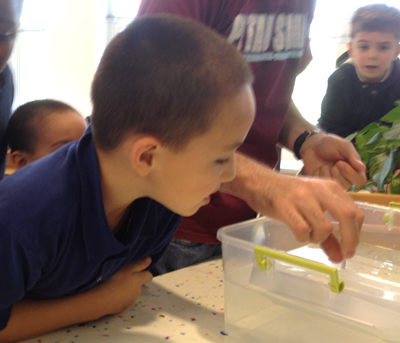
BTW student watches Mechanical Sciences student putting pennies in his boat to see how many it will hold.
During an end-of-the-school-year wrap-up session, Delaney shared about the experience. What was his favorite part? The kids. “Getting the opportunity to deal with kids of that age. They’re full of excitement; they’re ready to learn; they’re excited to learn. It definitely took all of us back a little bit to when we were that age and things we were able to do, just going back and learning the basics."
Delaney particularly enjoyed grappling with taking what he has learned about engineering down to a level elementary students could understand: "Personally I enjoy putting the PowerPoint together and…finding a way [to communicate] these concepts I know at such a high level, and figure out a way to look at them at the bottom level and see how simple they are...to relate to the kids." How did he do this? He asked himself: "When I was that age, how would I learn?"
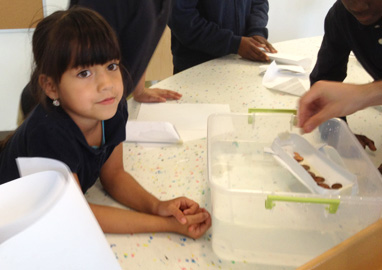
Young technology club member waits to test her boat.
Regarding the students’ engagement and whether it was a learning experience for them, He responded, “I think so, I really hope they did; they seemed to. We made certain effort to tie the activities we were doing to what we were actually teaching them. So we talked about buoyancy, and how it works when you displace water, and the way the water you displace is the upper force. So when they were making boats, we tried to remind them, ‘Remember, you want to make a big surface area so you can displace more water. So by tying that and having activities that they really enjoyed tie back to the concepts themselves, I think that’s definitely going to help them grasp them; maybe not entirely now, but later on, when they see them again, most certainly.”
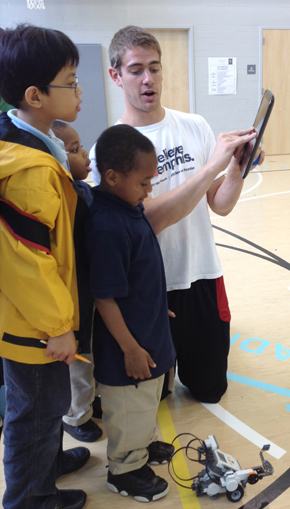
MechSE student explains robot controls to BTW students.
Delaney was pleasantly surprised at the kids’ grasp of engineering concepts: “It really was amazing how much the kids already knew. They are well beyond where I was at that age. We really tried to make the presentations more of an interactive thing, so it wasn’t just us lecturing but asking them questions, seeing what they knew. It was really shocking to see how much these kids actually knew, and how advanced they were for their age already.”
Does Delaney think this positive experience might entice him to abandon his dream of being an engineer and veer off into education? Probably not. But he definitely believes he will continue to work with youngsters, giving back to his community:
“I’ve always enjoyed dealing with kids of that age. I’ve always found it interesting. I volunteered in high school with some elementary schoolers as well. It’s a time in my life that I look back on fondly, so I try to relive it as best as I can. It is something I will definitely continue to do as I go into the work place; I don’t think I’m going to necessarily shift to become an elementary teacher or anything, but…companies are always looking for employees to do outreach like that. So it’s certainly something I will try to continue to do as I move forward in my life.”
The experience has been a positive and rewarding one for not only the students at Booker T. Washington, but for the members at Pi Tau Sigma as well. "We are grateful to be able to help the surrounding community and to help to encourage younger students to pursue careers in math, science, and engineering. Our members have gotten as much out of it if not more than the elementary schoolers. I hope that we continue to build this relationship and that it leads to future opportunities both within and outside of the technology club, and perhaps maybe even the community as a whole."
Regarding the benefits for the MechSE students, Delaney shared: “I think that we’ve gotten more out of it than the kids even have. It’s certainly helpful to help kids learn and all, but I think you can kind of lose track of things in college with everything that’s going on both in class and outside of class. This helps to draw you back to realize what the bigger picture of things is, and to just encourage you.”
What will make the time and energy the students have invested worth it? According to Delaney: "It is always fun to encourage and excite your students; hopefully it’ll lead them to careers in engineering someday. I mean, if one of those kids grows up to become an engineer when he didn’t think he would have been, it has been a success.”
Author/Photographer: Elizabeth Innes, Communications Specialist, I-STEM Education Initiative
More: Booker T. Washington, K-6 Outreach, MechSE, 2012













.jpg)
















